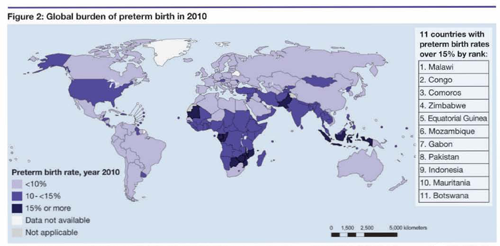The United States has a higher rate of babies born too early – and therefore at greater risk of death or health problems – than more than 125 other countries, including Rwanda, Uzbekistan, China and Latvia, according to a report out today.
About 12 percent of U.S. babies are born at 37 weeks or less, according to the report, which found a worldwide range of as few as 4.1 percent of babies in Belarus to as many as 18 percent in Malawi. Full term is considered 39 weeks.
While nearly two thirds of all pre-term births worldwide occur in Sub-Saharan African and Asia, the U.S. rate shows that “this is not just a developing country issue,” says Chris Howson, vice president for global programs at the March of Dimes.
His organization, along with the World Health Organization, Save the Children and the Partnership for Maternal, Newborn & Child Health, produced the report. It says about one million pre-term babies worldwide die shortly after birth, while others can suffer lifelong health problems.
Maternal risk factors include being under- or over-weight, having diabetes or high blood pressure, smoking, being younger than 17 or over age 40.
Rates within countries can vary widely. In the U.S., for example, the pre-term birth rate for white women in 2009 was 10.9 percent, compared with 17.5 percent for African American women, the report says.
In the U.S. and some other developed countries, pre-term births are also linked with a higher use of fertility drugs, which are associated with mothers carrying twins, triplets or more, increasing the chance of early labor. Some births in the U.S. are also induced early, either because the mother is having health problems or for the convenience of the doctor or mother.
Because pre-term births are costly and dangerous, physician groups, organizations like the March of Dimes and even some employers have ongoing efforts to discourage women and their doctors from scheduling births before 39 weeks, unless there is a health reason to do so. The Obama administration launched a $40 million program in February aimed at reducing the number of premature births, especially elective deliveries.
Those elective early births are also the subject of a March of Dimes education campaign, which says even though the absolute numbers are small, the risk of death for babies born just one to two weeks early is twice as high as for those born at 39 weeks.
Howson says the groups that signed on to the report have made a variety of suggestions for lowering the rate worldwide, ranging from inexpensive injections that can be given to mothers in preterm labor to help develop fetal lungs to encouraging women to have health exams before they get pregnant to check for risk factors.
“A preterm baby indicates a failure in the system,” Howson says.







